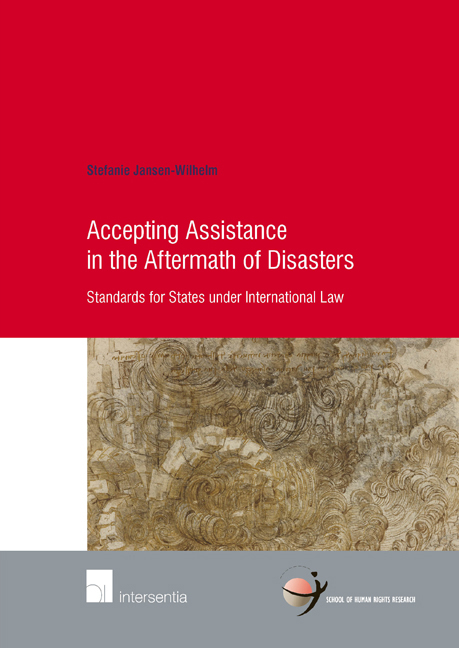Book contents
- Frontmatter
- Dedication
- Acknowledgements
- Contents
- List of Abbreviations
- Part I
- Chapter I General Introduction
- Chapter II Disaster Response and International Humanitarian Assistance: Background and Legal Framework
- Chapter III Practical Application of the Rules on International Humanitarian Assistance in Response to Disasters
- Preliminary Conclusions
- Part II
- Summary
- Bibliography
- Index
- Curriculum Vitae
- School of Human Rights Research Series
Chapter III - Practical Application of the Rules on International Humanitarian Assistance in Response to Disasters
from Part I
Published online by Cambridge University Press: 12 December 2017
- Frontmatter
- Dedication
- Acknowledgements
- Contents
- List of Abbreviations
- Part I
- Chapter I General Introduction
- Chapter II Disaster Response and International Humanitarian Assistance: Background and Legal Framework
- Chapter III Practical Application of the Rules on International Humanitarian Assistance in Response to Disasters
- Preliminary Conclusions
- Part II
- Summary
- Bibliography
- Index
- Curriculum Vitae
- School of Human Rights Research Series
Summary
INTRODUCTION
The goal of this Chapter is to illustrate the practical application of the rules that determine when an affected state moves from responding individually towards initiating the process of international humanitarian assistance and to giving consent to such assistance. As established in the previous Chapter, the legal framework on accepting humanitarian assistance in response to a disaster consists of three steps or layers. Underlying these three steps is the primary role of the affected state in responding to a disaster as a consequence of the sovereignty of the state. Due to this role, the affected state must in the first place make a needs-assessment (1). Based on this needs-assessment, the affected state must decide whether international humanitarian assistance is required and if so, the process of obtaining such assistance must be triggered (2). After valuing the offers of assistance available, the affected state must accept or decline these offers (3). At this stage, consent to offers of international humanitarian assistance may not be withheld for arbitrary reasons, when it would result in the violation of rules of international (human rights) law, or when the national capacity is overwhelmed.
The legal framework is established based on an analysis of the main (legal) sources on humanitarian assistance and disaster response. It is based on a theoretical understanding of what is expected of states. By looking at the way the legal framework is applied in practice, it is possible to further identify any problems and gaps that may exist. This way, it can be established whether the set of rules found in the previous Chapter is specific enough to speak of clear obligations for states to accept international humanitarian assistance. If not, it can be determined where the difficulties lie.
First, the individual response by the affected state will be discussed. The affected state is responsible for reacting to the occurrence of a disaster and must decide whether international aid is needed. If an affected state decides to accept international assistance, such assistance can be initiated through a request by the affected state or through an offer by another actor. The processes of initiation will be discussed in section 3. Accepting international humanitarian assistance is the point where the requirement of consent becomes visible. The role of consent will be explained in the fourth section.
- Type
- Chapter
- Information
- Accepting Assistance in the Aftermath of DisastersStandards for States under International Law, pp. 77 - 114Publisher: IntersentiaPrint publication year: 2015

